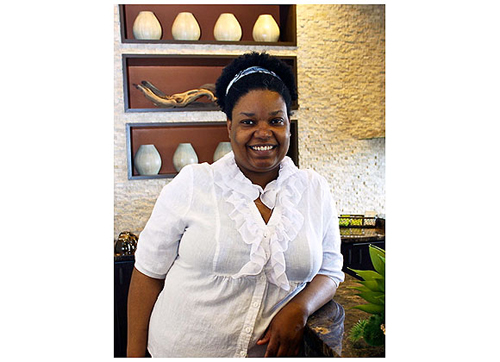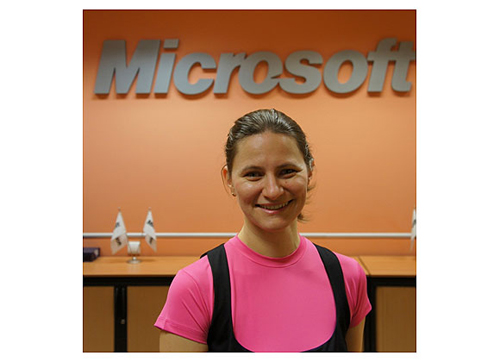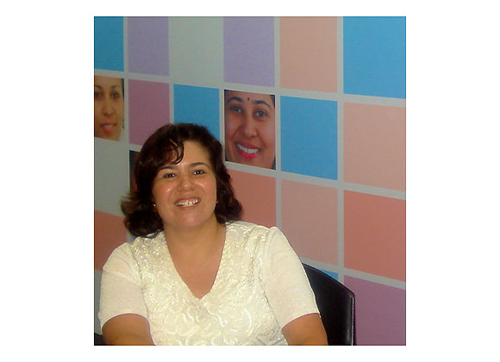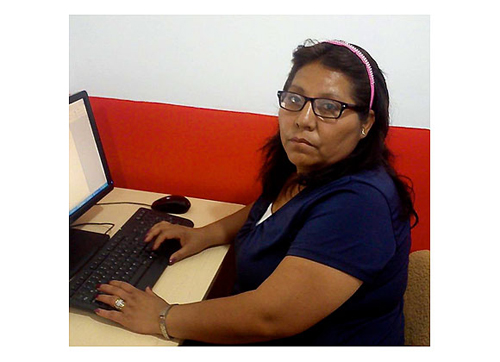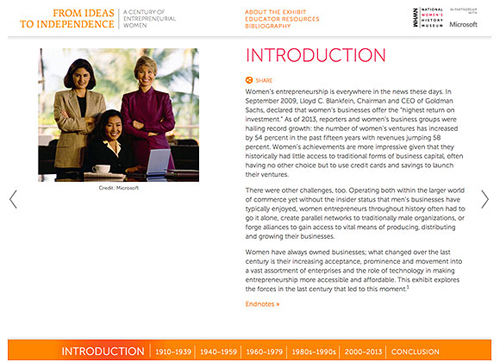Microsoft partners with the U.S. National Women’s History Museum to launch an exhibit examining the journey of American women who have started businesses over the last century.
REDMOND, Wash. – March 28, 2013 – At Microsoft, advocating for women in business is rooted in the corporate conscience, along with the belief in women’s power to blaze trails and shape their own destinies through entrepreneurship. In recognition of March commemorating both International Women’s Day and National Women’s History Month in the United States, Microsoft is shining a light on the stories of women entrepreneurs around the world and showcasing how technology has played a transformative role in enabling entrepreneurship.
Over the last 100 years, the upward trajectory of women entrepreneurs has been significant. Today, the proportion of the world’s sole-proprietor enterprises that are women-owned is between 20 and 40 percent. Women entrepreneurs have long fought to reach this level of representation in the world of commerce and enterprise, and they continue to fight for the continued advancement of women in business.
American Women Entrepreneurs
To explore these stories, Microsoft partnered with the U.S. National Women’s History Museum to launch a new online exhibit that examines the journey of American women who have started businesses over the last century.
Decade by decade, the exhibit explores the experience of women on their paths to economic and professional empowerment through stories, biographies and information about the socio-economic forces that have both hindered and helped this group over the last century. The exhibit also explores the pivotal role of technology in enabling women to launch and grow their business concepts, while balancing competing demands of work and life.
To add contemporary context to the conversation around women’s entrepreneurship, Microsoft commissioned a study among “new” and “established” entrepreneurs (those in business less than five years, and more than five years, respectively) to analyze the motivations, challenges and impact of technology associated with starting a business today. Among the findings was that technology has had a positive impact on an entrepreneur’s ability to launch a business: 71 percent of new entrepreneurs and 56 percent of established entrepreneurs agreed technology reduces the time needed to get a business up and running, a reality that is reflected in millions of tech-era success stories, both in the exhibit and continually unfolding around the globe.
Women Entrepreneurs Around the World
Business technologies have catalysed women business owners to carve out corporate niches and independent professional identities. For example, Natalia Dimitrova recently founded Acta Verba, a PR company based in Bulgaria. Dimitrova launched her own business because she wanted to develop her professional passion in consulting, while striking a more flexible work-life balance that allowed her more time with her children.
Dmitrova uses Microsoft technology, including Lync, Outlook and Word, for the day-to-day activities of her business. She says she chose Microsoft because of a user-friendly interface, quality and security, which ultimately enables her to complete tasks efficiently, achieve greater organization and devote more time to family and friends. “Microsoft has taught me that if one follows her dreams, success is right around the corner – it’s just a matter of time to reach that corner,” she says.
Microsoft research and conversations with women entrepreneurs have also revealed that the desire to be one’s own boss, and the associated potential for greater flexibility and work-life balance, is a leading reason women start businesses. In this context, technology is a critical asset in facilitating business communications and operations, and in bridging businesswomen’s personal and professional interests. Cloud productivity solutions like Microsoft Office 365 have facilitated the entry of many women entrepreneurs in both established and emerging markets. Removing many traditional barriers to marketplace entry, including resource constraints and lack of deep technology knowledge, cloud technology offers secure and mobile business collaboration and productivity options at a price point affordable for many small business owners. Its accessible productivity and collaboration features allow women entrepreneurs to present their concepts and operate on a level playing field with large, established competitors.
For more examples of women-owned businesses launched by technology, check out the slideshow below. Visit the Microsoft Business Hub to explore the exhibit and additional stories of female entrepreneurship, as well as find business-building resources for all small businesses and entrepreneurs.
Rosa Ignacia Morales (front) lives in Mexico where she sells her tomatoes to WalMart through Fundación Ayú, an organization that leads the community development program in vulnerable areas across the Mixteca region of Oazaca, Mexico. Morales is a beneficiary of the FUNDEMEX-Microsoft donation program and was trained to use Microsoft technology. She uses her new technology skills to help run her tomato business and trained her 10-year-old daughter on the technology to give her an advantage at school. By leveraging technology in her business, Morales has become more confident and is now seen as a community leader. Image credit: Microsoft
Inga Nakhmanson loves sci-fi, and coupled with her interest in fashion, she decided to bring the virtual wardrobe to life by starting Fitting Reality. Based in Moscow, Fitting Reality creates technology that allows customers to try on clothes while shopping online. Fitting Reality’s technology marries Kinect for Windows and webcam photos with Windows Azure to provide a rendered 3D image of each customer, so that they can “fit” clothes on themselves before making a purchase. Today, Fitting Reality has 14 employees and is expecting tremendous growth. Image credit: Microsoft
Khrystyna Smirnova is the co-owner of her family business, The Tartak Company, a producer of hardwood floor, furniture and orthopedic mattresses based in the Ukraine. She utilizes PowerPoint to develop successful and professional sales and marketing pitches and relies on Microsoft Office software and Windows for day-to-day business. Image credit: Microsoft
While also working a full-time job, Chaundra Smith founded Naturally Me, which makes luxury body-care products that the average working woman can afford. Smith relies on cloud-based email, messaging, videoconferencing and document offered by Microsoft Office 365 to help Naturally Me flourish. Office 365 has allowed her team of half a dozen sales and PR consultants to collaborate on a schedule although based in different time zones. Image credit: Microsoft
Natalia Dimitrova recently founded Bulgarian PR company, Acta Verba. To power her day-to-day business, she uses Microsoft technology including Lync, Outlook and Word. Dimitrova chose Microsoft because of the user-friendly interface, quality and security. The technology she uses on a daily basis ultimately allows her to complete tasks efficiently and in a timely manner. In her own words, “Microsoft has taught me that if one follows her dreams, success is inevitable and often just around the corner – it’s just a matter of time to reach that corner.” Image credit: Microsoft
Maria Claudia Salaro and her husband run Brazilian start-up Saluton Idiomas. Launched in 2007, Saluton Idiomas teaches languages such as English, French, Italian, Spanish and Portuguese to non-nationals in Brazil using Microsoft platforms including SkyDrive, Outlook and Office. Salaro attributes a portion of her business’ success to Microsoft solutions: “When you love what you do and you persist, there aren’t problems, only solutions – and Microsoft has given us some of the solutions. Image credit: Microsoft
Lina Dzene founded Latvian consulting firm Dynamic University less than two years ago. The firm provides strategic guidance and professional expertise to help education institutions of all kinds achieve greater excellence, navigate change and drive more powerful partnerships in Latvia and elsewhere in Eastern Europe. Dzene chooses Office 365 to help run her day-to-day business because of its widespread adoption, efficiency and overall value. Image credit: Microsoft
Maria del Carmen Soriano, based in Mexico City, runs a business manufacturing and selling products made from amaranth, a grain commonly grown in the region. She took advantage of Pro Mujer (an agency that offers business training, microfinance and healthcare support to women in Latin America) three years ago and learned how to use Microsoft technology for her business. Microsoft technology allows Soriano to create calendars to organize production of amaranth as well as keep track of products, costs, vendors, expiration dates, sales and expenses in Excel spreadsheets. Image credit: Microsoft
Jennifer Cattaui, attorney, executive editor of a fashion magazine and new mom, founded New York-based Babesta, an online retailer of leading-edge children’s clothing. Cattaui found a solution in Microsoft Office 365, which allowed the Babesta team to communicate via the cloud, sharing email, calendars, documents and conferencing. With Office 365, all employees can access the information they need, any time, any place, and collaborate in real time by instant messaging, audio conferencing or video conferencing through their computers. Image credit: Microsoft
Yael Givon founded Israel-based Stevie in 2011 after observing a need for social network integration with television. Launched with the assistance of the Microsoft Accelerator program, Stevie is a “social TV” solution that creates shows based on your social networks. Givon stays passionate about her start-up because she works with her spouse. “My partner in business is also my life partner, so we’ve been enjoying personal, family and professional growth all at once.” Image credit: Microsoft
Crystal Li founded Borgge LLC in 2011. The company focuses on information aggregation, search, recommendation and mobile Internet technologies. Borgge’s most successful offering is its app, Banbao, a personalized information aggregation service. Banbao monitors users’ social feeds and activity on a variety of news sites to create a personal information portal. The app is compatible with Windows Phone, IE10 and Windows 8. Image credit: Microsoft
Microsoft is proud to partner with the National Women’s History Museum to bring the stories of trailblazing women entrepreneurs to life. For more on the journey of women’s entrepreneurship and the prominent role technology has played in enabling women to launch, grow and thrive new businesses, please visit the exhibit: https://entrepreneurs.nwhm.org. Image credit: Microsoft
*Source: Microsoft




